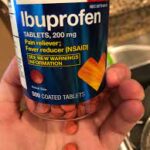Is Advil a Vegan Medication?

Advil is a brand of ibuprofen used to relieve pain, tenderness, swelling, and stiffness caused by osteoarthritis (arthritis caused by a breakdown of the lining of the joints) and rheumatoid arthritis (arthritis caused by swelling of the lining of the joints). Advil is manufactured by Pfizer Inc. a pharmaceutical company known for many well-known drugs.
Advil is also used to relieve mild to moderate pain, including menstrual pain (pain that happens before or during a menstrual period). Nonprescription ibuprofen is used to reduce fever and to relieve minor aches and pain from headaches, muscle aches, arthritis, menstrual periods, the common cold, toothaches, and backaches. Ibuprofen is in a class of medications called NSAIDs. It works by stopping the body’s production of a substance that causes pain, fever, and inflammation.
What is a vegan Product?
A product that is vegan does not contain any animal ingredients or animal-derived ingredients. This includes, but is not limited to, honey, beeswax, lanolin, collagen, albumen, carmine, cholesterol, gelatin, and many others. To many, the term “vegan” also means that a product is free from animal testing as well.
Is Advil Vegan?
Yes, according to Vegan Med Advil, Motrin, and Nurofen are all vegan. However, companies use a variety of animal products in the capsules, fillers, and pharmaceutical ink. According to the FDA, Advil contains the following inactive ingredients: Carnauba wax, colloidal silicon dioxide, croscarmellose sodium, hypromellose, lactose, magnesium stearate, microcrystalline cellulose, propylene glycol, titanium dioxide.
Advil Safety Information
People who take nonsteroidal anti-inflammatory drugs (NSAIDs) (other than aspirin) such as ibuprofen may have a higher risk of having a heart attack or a stroke than people who do not take these medications. These events may happen without warning and may cause death. This risk may be higher for people who take NSAIDs for a long time. Do not take an NSAID such as ibuprofen if you have recently had a heart attack, unless directed to do so by your doctor. Tell your doctor if you or anyone in your family has or has ever had heart disease, a heart attack, or a stroke; if you smoke; and if you have or have ever had high cholesterol, high blood pressure, or diabetes. Get emergency medical help right away if you experience any of the following symptoms: chest pain, shortness of breath, weakness in one part or side of the body, or slurred speech.
If you will be undergoing a coronary artery bypass graft (CABG; a type of heart surgery), you should not take ibuprofen right before or right after the surgery.
NSAIDs such as ibuprofen may cause ulcers, bleeding, or holes in the stomach or intestine. These problems may develop at any time during treatment, may happen without warning symptoms, and may cause death. The risk may be higher for people who take NSAIDs for a long time, are older in age, have poor health, or who drink three or more alcoholic drinks per day while taking ibuprofen. Tell your doctor if you take any of the following medications: anticoagulants (‘blood thinners’) such as warfarin (Coumadin, Jantoven); aspirin; other NSAIDs such as ketoprofen and naproxen (Aleve, Naprosyn); oral steroids such as dexamethasone, methylprednisolone (Medrol), and prednisone (Rayos); selective serotonin reuptake inhibitors (SSRIs) such as citalopram (Celexa), fluoxetine (Prozac, Sarafem, Selfemra, in Symbyax), fluvoxamine (Luvox), paroxetine (Brisdelle, Paxil, Pexeva), and sertraline (Zoloft); or serotonin norepinephrine reuptake inhibitors (SNRIs) such as desvenlafaxine (Khedezla, Pristiq), duloxetine (Cymbalta), and venlafaxine (Effexor XR). Also tell your doctor if you have or have ever had ulcers, bleeding in your stomach or intestines, or other bleeding disorders. If you experience any of the following symptoms, stop taking ibuprofen and call your doctor: stomach pain, heartburn, vomit that is bloody or looks like coffee grounds, blood in the stool, or black and tarry stools.
Keep all appointments with your doctor and the laboratory. Your doctor will monitor your symptoms carefully and will probably order certain tests to check your body’s response to ibuprofen. Be sure to tell your doctor how you are feeling so that your doctor can prescribe the right amount of medication to treat your condition with the lowest risk of serious side effects.





